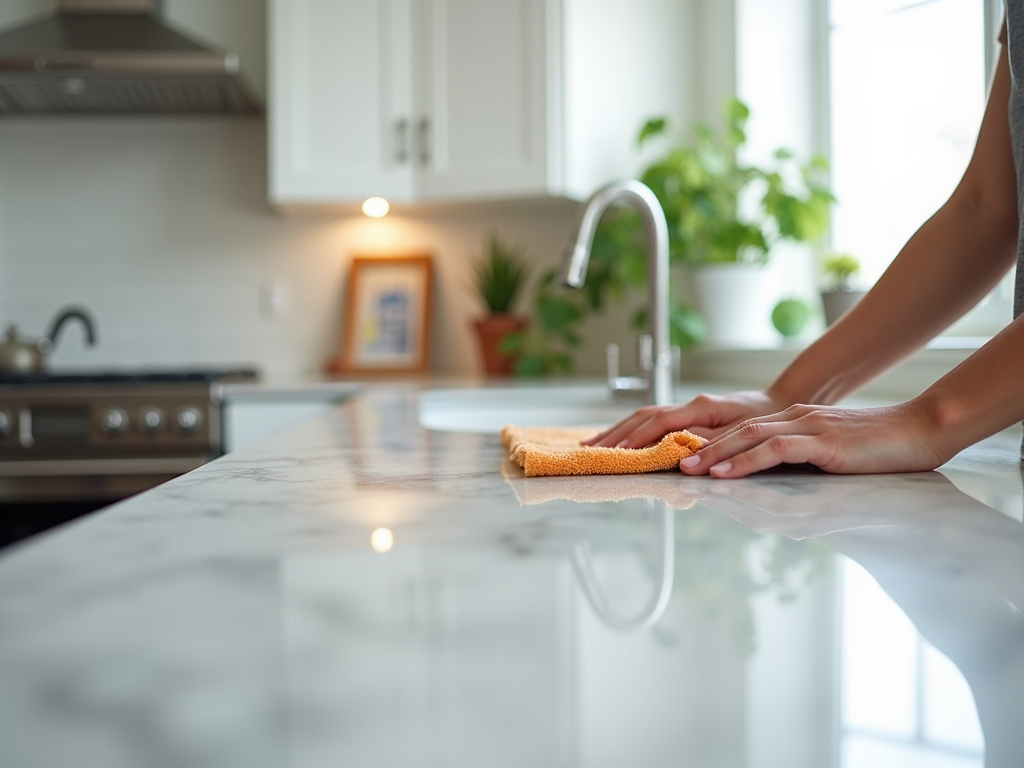Keeping countertops sparkling clean is essential for both aesthetic appeal and maintaining a hygienic kitchen environment. Each type of countertop material requires specific cleaning methods to preserve its integrity and beauty. Whether you’re dealing with the luxurious marble, the durable quartz, the rustic butcher block, or other materials, understanding the proper cleaning techniques is key.
Marble Countertops

Marble is known for its elegant and luxurious appearance, but it’s also one of the most porous and delicate countertop materials. Due to its susceptibility to staining and etching, it requires gentle cleaning and consistent maintenance. Start by wiping any spills immediately with a soft cloth to prevent stains. For everyday cleaning, use a solution of warm water and mild dish soap.
Avoid acidic or abrasive cleaners, as they can damage marble’s surface. For a deeper clean, consider mixing baking soda and water to form a paste. Apply it gently to the surface, let it sit for a few hours, and then rinse with warm water. To maintain marble’s shine, use a commercial stone polish designed for marble surfaces.
Quartz Countertops
Quartz is a popular choice for kitchen countertops due to its smooth, non-porous surface and resistance to staining. Unlike natural stones, quartz is less likely to harbor bacteria, making it relatively low-maintenance. For daily cleaning, simply use a gentle dishwashing liquid mixed with warm water, and wipe the surface with a soft cloth.
To tackle tougher spots or dried spills, make a paste with baking soda and water, apply it to the stain, let it sit, and then scrub gently. Avoid harsh chemicals or scouring pads to prevent scratching or dulling the surface. To enhance quartz’s natural luster, you can occasionally use a non-abrasive polish specifically designed for quartz counters.
Butcher Block Countertops
Butcher block countertops bring a warm, natural feel to any kitchen, but they do require proper care to prevent damage and maintain their appearance. These wooden countertops can easily absorb moisture and trap bacteria, so regular cleaning is essential. After each use, wipe down the surface with a combination of water and mild dish soap.
For deeper cleaning and to remove odors, sprinkle the surface with coarse salt, then use a lemon half to scrub the block. This natural method both cleans and deodorizes the top. It’s important to season butcher block countertops regularly with mineral oil to repel moisture and maintain the wood. Apply the oil with a clean cloth, let it soak in, and wipe off any excess.
- Avoid cutting directly on the surface to preserve its smoothness.
- Use trivets and hot pads to protect it from heat damage.
- Consider re-sanding the surface if it becomes heavily stained or scratched.
Granite Countertops
Granite is yet another popular choice due to its stunning appearance and durability. Despite its tough exterior, it must be sealed regularly to prevent stains. For daily cleaning, use a gentle cloth with warm water and a pH-balanced cleaner to avoid stripping away the sealant.
To remove stubborn stains, create a paste using baking soda and water. Apply it to the stained area, cover it with plastic wrap, and let it sit overnight before rinsing. In order to avoid scratches, refrain from using abrasive materials and tools. Regular sealing—at least once a year—will help maintain its beauty and resistance to staining.
Laminate Countertops
Laminate countertops are perhaps the easiest to maintain due to their affordable, durable, and moisture-resistant nature. For general upkeep, wipe them down with a damp cloth and a gentle detergent. However, for deeper cleaning, a solution of baking soda and water can work wonders on persistent stains.
While laminate is resistant to many types of damage, it can be scratched or burnt easily. Always use cutting boards and trivets to protect the surface. Additionally, refrain from using bleach or abrasive cleaners, as they can cause discoloration. Armed with these tips, laminate countertops can remain vibrant and long-lasting with minimal effort.
Conclusion
Maintaining your countertops involves understanding the specific needs of each material. From the delicate nature of marble to the robustness of laminate, each requires tailored cleaning techniques to ensure longevity and maintain an attractive appearance. As versatile as they are, these materials demand a little attention and care to keep your kitchen both beautiful and functional.
Frequently Asked Questions
- Can I use vinegar on marble countertops? No, vinegar is acidic and can cause etching on marble surfaces. It’s best to use a pH-neutral cleaner specifically designed for stone.
- How often should I seal my granite countertops? It is recommended to seal granite countertops once a year or as soon as water no longer beads on the surface.
- Can I cut directly on a quartz countertop? Although quartz is durable, it’s advisable to use a cutting board to avoid dulling your knives and potential scratches.
- What can I do to remove minor scratches from butcher block countertops? For minor scratches, lightly sand the affected area, then apply mineral oil to restore the surface.
- Are laminate countertops heat resistant? While laminate is moisture-resistant, it is not heat-resistant. Always use trivets or pads underneath hot dishes to prevent damage.
